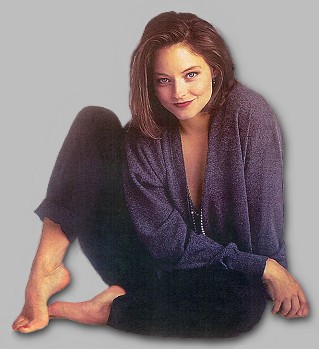Born Alicia Christian Foster on November, 19, 1962, Jodie Foster made her acting debut in a Coppertone television commercial in 1966. She starred in the controversial Martin Scorsese film Taxi Driver in 1976 as a teenage prostitute. This film won her an Oscar nomination for best supporting actress; unfortunately, it also won her the unwanted attentions of a troubled young man named John Hinckley. He soon learned from a magazine article that she would be attending Yale University and took it as the perfect opportunity to meet her.
In her younger years, Jodie attended the elite school Lycee Francais in Los Angeles and graduated as class valedictorian in 1980. In pursuit of higher education, Jodie went on to attend Yale in New Haven, Connecticut. She had hoped to be a typical college student; but John Hinckley's obsession with her dashed any hopes of her blending in with the other Yalies.
After the Hinckley incident, Jodie bounced back and went on to win two Oscars for her performances in The Accused (1988) and The Silence of the Lambs (1991). She also made her directorial debut in the 1991 film Little Man Tate; the story of a child prodigy torn between his working-class mom and his teacher.
To date, she refuses to publicly comment on the incident involving John Hinckley. She is well-known for canceling interviews or walking out if a reporter tries to question her about Hinckley. As recently as 1991, she canceled an interview with NBC's Today Show when she was told Hinckley's name would be mentioned in her introduction, but they probably wouldn't ask her about it.
Her only response about the incident came in 1981 in the article Why Me?, published in Esquire magazine. In the interview, she stated that she was running across the Yale campus with a friend when she learned President Reagan had been shot. At the time, she had no idea that the shooter was the strange man who kept calling and pestering her with love letters. When Hinckley's motivations came to light, the press "swarmed through the campus like a cavalry invasion. I couldn't protect myself from being trampled." The news of Hinckley's motivations hit her emotionally like a ton of bricks. When she learned that her photographs and college address were found in Hinckley's motel room, she was shaken.
Twenty months after the shooting, she wrote of the incident: "My body jerked in painful convulsions. I hurt. I was no longer thinking of the President, of the assailant, of the crime, of the press. I was crying for myself. Me, the unwilling victim. The one who would pay in the end. The one who paid all along - and, yes, keeps paying." She gave a press conference, answered a few questions, and then attempted to return to student life.
After hearing of Hinckley's not guilty verdict, Foster was "horrified" and the wave of emotions returned again. She was further angered by a poem published in the 1982 National Enquirer. The poem's author? John Hinckley. The poem contained the lines "I have come to shoot you down with my bloody gun . . . look here at my bloody knife, I think I'll stab you first, deep into your bloody heart, it should quench my thirst." Jodie was furious and took the poem as a direct threat against her life. Her attorneys put an end to the fiasco by threatening to sue the magazine.
Unfortunately for Foster, Hinckley was not the only "crazy" obsessed with her. Shortly after Hinckley's arrest, a second man, Edward Richardson, while in the process of finishing Hinckley's job and killing the President. He also claimed to be obsessed with Foster and admitted to visiting Yale with the intention of killing her. He described following her across the Yale campus with a loaded gun in his pocket. He changed plans after deciding she was "too pretty."

